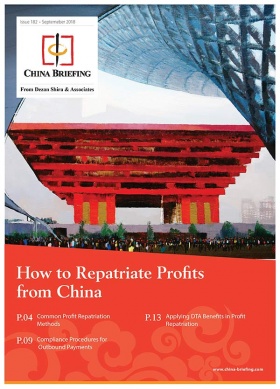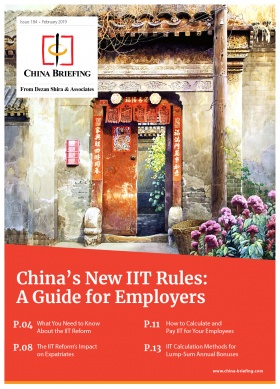Establishing a Hong Kong Holding Company for Your Business in China
Many companies looking at the Chinese market choose to establish a holding company or special purpose vehicle (SPV) to hold their Chinese investments.
This typically provides flexibility and an added layer of protection to their corporate structure.
Foreign investors have commonly chosen Hong Kong to set up a holding company or SPV.
There are many reasons for this – Hong Kong is in close proximity to mainland China, it remains a key financial hub in Asia, and has a transparent legal and highly developed financial system.
To add to these, Hong Kong continues to be one of the easiest places to do business, ranking fourth of 190 economies in 2019, much higher than China, which is ranked at number 48.
However, recently there have been heightening concerns about Hong Kong’s business environment becoming more regulated.
Marcos Salgado, Assistant Manager of Dezan Shira & Associates Business Advisory Services in Hong Kong, explains the situation from on the ground, “while there have been some recent concerns surrounding the tightening of Hong Kong’s anti-money laundering regulations and know your customer (KYC) requirements, these changes offer foreign investors greater legal certainty by enhancing the rule of law and safeguarding the integrity and stability of the financial system.”
Salgado adds, “in addition, Hong Kong has implemented a two-tier profits tax system to encourage investment from SMEs.”
Therefore, the reality is, that though the business environment is getting more challenging for foreign investors, Hong Kong still holds many key advantages for businesses, stemming from its free economy, low tax rates, and its simple and transparent regulatory environment.
Here we highlight three key benefits to setting up a holding company in Hong Kong.
Why set up a holding company in Hong Kong?
1) Corporate structure benefits
A holding company in Hong Kong adds to the robustness of a group’s legal entity holding structure in many ways, as it is a reliable base from which to invest in China.
Having a Hong Kong entity in the group structure provides investors with some flexibility in terms of selling their PRC investment.
Paul Dwyer, Head of International Tax and Transfer Pricing at Dezan Shira & Associates provides an example to illustrate this, “Take for example a common holding structure which consists of a US HQ wholly owning a Hong Kong incorporated company, which in turn wholly owns a PRC wholly foreign owned entity (WFOE).”
“The PRC WFOE can be sold directly by way of the Hong Kong entity selling its shares in the WFOE. Alternatively, the US HQ can indirectly sell the WFOE by way of disposing its shares in the Hong Kong entity,” Dwyer explains.
“Now China does have strict rules dealing with the latter case where an indirect sale of ‘PRC taxable assets’ are made. It is important to be aware of these and we have discussed these further below.”
2) Preferential tax regime
Hong Kong has a preferential tax regime and adopts a territorial basis of taxation.
Profits tax is payable by every person (defined to include corporation, partnership, and sole proprietorship) carrying on a trade, profession, or business in Hong Kong on profits arising in or derived from Hong Kong from that trade, profession, or business. In other words, profits which do not have a Hong Kong source are not subject to profits tax.
Hong Kong’s profits tax rate is very low. Incorporated entities are subject to profits tax on two-tiered system.
The first HKD 2,000,000 of profits are subject to profits tax at 8.25 percent with the remainder subject to profits tax at 16.5 percent. This is quite low when compared with China’s corporate income tax rate (CIT) of 25 percent. Capital gains and receipts that are capital in nature are also not subject to tax.
Hong Kong has a very expansive tax treaty network and does not impose withholding taxes on payments of dividends and interest.
China has concluded a double tax agreement (DTA) with Hong Kong. The treaty provides, subject to meeting certain conditions, for a preferential rate of withholding tax on dividends of five percent.
If the necessary conditions are satisfied, this can be of great benefit as profits can be repatriated back to the HQ or to Hong Kong efficiently, minimizing withholding tax leakage.
3) Cash pooling
If an investor wants to re-allocate profits from the foreign-invested enterprise (FIE), a holding company offers a solution to do so, which bypasses the need to remitting it to the parent company.
Funds can be pooled in the offshore holding company, where tax on the transaction is often lower, and re-invested elsewhere.
Hong Kong is one the largest offshore RMB clearing centers. This means the two territories are the best equipped to handle RMB-denominated banking, including receiving dividends and other fees from China-based entities. It also enables the holding company to assume cash pooling functions.
Ensuring your holding company is compliant
In light of the Organisation for Economic Cooperation and Development’s (OECD) base erosion and profit shifting (BEPS) program, tax authorities across the world are cracking down on the practice of companies entering into transactions lacking in sufficient business substance and which are performed primarily to obtain a tax benefit/advantage.
For example, China, has strict anti-avoidance rules concerning the indirect transfers of PRC taxable assets.
Dwyer explains, “it is important to be mindful of these to not run afoul of these laws. In many cases, even when the indirect transfer is done for valid commercial reasons, there are still administrative and filing requirements.”
Both Hong Kong and the PRC have also recently formalized transfer pricing rules aimed at ensuring that companies pay their fair share of taxes into their domestic legislation.
“These laws, coupled with the tax authorities’ increased focus and scrutiny on related party transactions, means that companies need to think carefully before performing these transactions; it is important to show justifiable commercial reasons and that the transactions are legitimate,” Dwyer adds.
Final points
Despite the clear benefits to establishing a holding company in Hong Kong, businesses should consider carefully whether this is the most appropriate corporate structure for them, weighing up the pros and cons, as well as doing a thorough cost-benefit analysis.
Further, once set up and enacted, it is prudent to consult your local advisers to ensure the holding structure and entities comply with the local laws and requirements.
About Us
China Briefing is produced by Dezan Shira & Associates. The firm assists foreign investors throughout Asia from offices across the world, including in Dalian, Beijing, Shanghai, Guangzhou, Shenzhen, and Hong Kong. Readers may write to china@dezshira.com for more support on doing business in China.
- Previous Article The New Foreign Investment Law in China – New Issue of China Briefing Magazine
- Next Article China’s Special International Trade Zones: An Explainer








